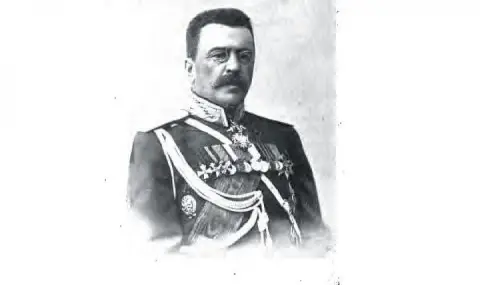On June 23, 1882, Prince Alexander Battenberg appoints an official government of the Principality of Bulgaria headed by Russian General Leonid Sobolev.
Leonid Sobolev took part in the Russo-Turkish War of 1877-1878 in Bulgaria as a staff officer of the active Russian army.
Participated in the battles at Pleven, Mount Shipka and the winter crossing of Stara Planina.
Receives the Order of St. George IV degree. Manages the office of Prince Cherkazki – leading the civil administration of the newly liberated Bulgarian lands. He reached the military rank of major general (1880), writes istoria.bg.
After the introduction of the Powers of Attorney regime on July 1, 1881, the Prime Minister, Gen. Ernroth resigns and dissolves the government. Until the middle of 1882, Prince Alexander I of Battenberg (1879 – 1886) alone led the executive power in the Principality of Bulgaria without a prime minister. When the liberals launched a widespread public protest against the monarch's one-man regime, he sought the help of Russia and the Russian generals.
On June 23 (July 5 – old style) 1882, the prince appointed as Prime Minister Gen. Leonid Sobolev, and for Minister of War Gen. Alexander Kaulbars. The two generals were sent by the Russian emperor to strengthen Battenberg's one-man regime.
Gen. Sobolev also holds the position of Minister of Internal Affairs.
Gen Sobolev's government supports the prince and his regime. It restores the activities of the National Assembly and abolishes censorship of the press. Maintains good relations with Russia and protects its political and economic interests.
During the first months of his administration, Gen. Sobolev is supported by the conservatives. From 17.IX.1882 to 14.I.1883 he managed the Ministry of Public Buildings, Agriculture and Trade, and from 3 March 1883 the Ministry of Finance.
A new electoral law was adopted with the introduction of property and educational qualifications.
Officials are deprived of the right to be elected as people's representatives, the number of deputies is reduced, and their term of office is increased to 6 years.
In the elections for the ONS on December 10, 1882, the conservatives won a victory. A number of laws are passed on the organization of the state: Law on Territorial and Administrative Division, Law on Officials, Law on Conversion of Natural Tithes into Monetary Tithes, etc.
Controversies arose between the Generals and the Conservatives over the railways. The generals want the construction of the Danube line, which would connect Bulgaria with Russia, and the conservatives – for the Tsaribrod-Vakarel section, which would connect the country with Western Europe. The conservatives leave the government and the generals appoint liberals in their place. The positions of the prince are threatened and he again seeks the help of Russia, asking for the return of gen. Ernroth. But the Russian government already considers Battenberg inconvenient and sends the diplomat Yonin to Bulgaria to support Generals Sobolev and Kaulbars.
But an international action is taken against Bulgaria by
Turkey and Greece regarding waqf properties (the former Turkish homesteads).
There is a movement in the country to restore the Tarnovo Constitution. This forced Prince Alexander I Battenberg on September 6, 1883 to restore the Turnovo Constitution and dissolve the cabinet of Gen. Leonid Sobolev.
On September 7 (September 19 – old style) 1883, Dragan Tsankov was appointed prime minister, who formed a coalition cabinet with the participation of liberals and conservatives. Due to disagreement with the policy of the prince and the conservatives, the general resigned and returned to Russia.
In his homeland, Sobolev continued to serve in the army as commander of the 1st Rifle Brigade of the XXXVII Infantry Division and chief of staff of the Moscow Military District. In 1886, he published his historical work "Towards the Latest History of Bulgaria". Participated in the Russo-Japanese War in 1904-1905 as commander of the VI Army Corps.
Gen. Leonid Sobolev died on September 30 (October 13 – old style) 1913 in Russia, in Toronetsky District, Pskov Governorate.
